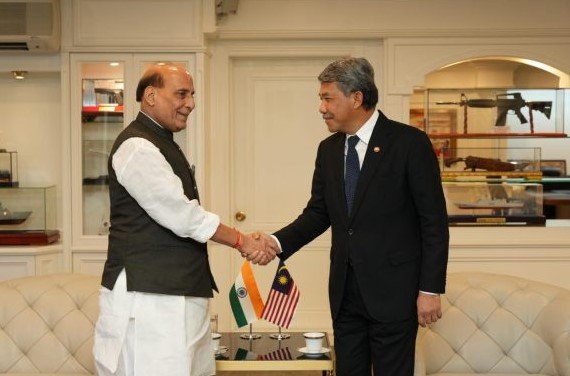Kuala Lumpur brushes aside Islamabad’s plea to block Indian delegation, signaling a rare snub in South Asian diplomacy
Pakistan’s latest diplomatic attempt to flex influence through appeals to Islamic unity hit a wall in Malaysia. A high-level Indian parliamentary delegation led by JDU MP Sanjay Jha faced no hurdles in Kuala Lumpur — despite a behind-the-scenes move by the Pakistani embassy to have the visit cancelled.
The Malaysian government quietly but firmly rejected Islamabad’s request, allowing the Indian team to carry out its full slate of meetings and engagements. Sources familiar with the matter called it a “complete rebuff” to Pakistan’s appeal, and a sign that Kuala Lumpur wasn’t interested in letting religion dictate its foreign policy choices.
Pakistani Interference — And Malaysia’s Quiet Refusal
It started with a diplomatic push.
Pakistani officials reportedly contacted Malaysian authorities ahead of the Indian MPs’ scheduled events. The messaging revolved around “Islamic solidarity” — a reference to the religious kinship Pakistan often tries to invoke, especially when it comes to issues like Kashmir.
But this time, it didn’t land.
Malaysian officials, according to Indian sources, neither cancelled nor altered a single event. The Indian delegation went ahead with every planned meeting.
Just one sentence: That, in itself, was the statement.
The message was clear: Malaysia wouldn’t let its bilateral ties with India be hijacked by Pakistan’s political narratives. Especially not on foreign soil.

Who Was in the Delegation and What Was the Mission?
Led by JDU’s Sanjay Jha, the cross-party team had MPs from BJP, Congress, Trinamool, CPM, and even a former diplomat.
Here’s the full list of key delegates:
-
Sanjay Jha (JDU)
-
Aparajita Sarangi, Brij Lal, Pradan Baruah, Hemang Joshi (BJP)
-
Salman Khurshid (Congress)
-
Abhishek Banerjee (Trinamool Congress)
-
John Brittas (CPM)
-
Mohan Kumar (former diplomat)
They weren’t just on a sightseeing tour. Their mission had teeth.
In the wake of the deadly Pahalgam terror attack that killed 27 civilians and India’s sharp counter — Operation Sindoor — the Indian government had dispatched seven international delegations to expose Pakistan’s support for cross-border terrorism.
This team covered Japan, South Korea, Singapore, Indonesia, and finally, Malaysia.
Their goal? Put India’s position front and center.
What Pakistan Tried to Do — and Why It Didn’t Work
Pakistan’s strategy was familiar: raise Kashmir, question India’s treatment of Muslims, and frame itself as the defender of Islamic causes.
But even that had its limits.
South and Southeast Asian countries, while largely Muslim in population, don’t always buy into Pakistan’s framing of regional politics. Especially when it involves disrupting diplomatic visits.
One-sentence paragraph again: And that’s precisely what happened here.
There’s also diplomatic fatigue. Repeatedly invoking religion to shape bilateral decisions hasn’t always worked for Pakistan. Many nations, including Malaysia, are focused on their own economic and security interests.
Islamabad’s approach, one source said, “simply didn’t find traction.”
Malaysia’s Real Calculus: Trade, Stability, and a Changing Global Order
Malaysia and India share a trade relationship worth over $20 billion. And despite occasional diplomatic wrinkles, both nations benefit from that.
In fact, here’s a quick snapshot of recent India-Malaysia trade data:
| Year | Total Trade ($ Billion) | Key Sectors |
|---|---|---|
| 2021 | 14.5 | Palm oil, electronics, IT |
| 2022 | 17.2 | Machinery, pharmaceuticals |
| 2023 | 20.3 | Renewable energy, services |
Malaysia isn’t looking to pick sides. But it’s also not willing to alienate India for rhetoric that doesn’t translate into tangible gains.
The country’s foreign policy, especially under PM Anwar Ibrahim, has leaned pragmatic.
No wonder the Pakistani attempt got shrugged off.
India’s Message Abroad and What’s Next
Speaking to IANS after returning to India, Sanjay Jha said the delegation’s mission was simple — share India’s position on terrorism and Pakistan’s alleged complicity.
“We went with facts and conviction,” Jha said.
The effort comes as part of a broader diplomatic offensive post-Pahalgam. India’s strategy now involves multi-party consensus, global outreach, and data-backed allegations about terror camps across the border.
This shift — from just complaining to campaigning — marks a big change.
It also sends a signal to global capitals: India is ready to counter Pakistan’s narratives on every front.
Not with loud protests, but with quiet, strategic pressure.
The Regional Ripple Effect — Beyond This One Episode
This isn’t just about Malaysia or this one delegation. It’s about a pattern taking shape.
Across capitals from Tokyo to Jakarta, Indian lawmakers are now being seen less as party representatives and more as national emissaries on key issues.
Here’s why that matters:
-
It builds a non-partisan image for India’s external messaging.
-
It forces countries to view India’s case outside BJP-versus-Congress frames.
-
It keeps pressure on Pakistan across multiple forums — from diplomatic meetings to regional alliances.
So while this particular visit is over, the real action is still unfolding.
India’s move, and Malaysia’s quiet nod, may be small pieces — but they’re part of a bigger geopolitical puzzle that’s now reshaping the subcontinent’s image in Southeast Asia.
